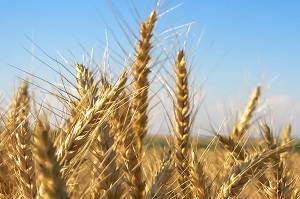Bulgaria: Less but more expensive wheat
Less but more expensive wheat, compensated by the rich harvest of corn. Problems with vegetables in northern Bulgaria, but expected high yields of autumn fruit trees. Milk and meat dependent on the European price trend. Such briefly is the picture of Bulgarian agriculture at the end of an atypical summer, which has caused prolonged drought in most of Europe and torrential rains in Bulgaria.
Rains and thunder have clearly affected wheat harvest, the first data showed after the end of the harvest in the country. According to information from the International Grains Council, the harvest in Bulgaria will reach 5.6 million tons, compared to 6.2 million a year ago.
The drop of 9.6% immediately affected prices. “Currently, the vendors want 380 BGN per tonne for the new wheat, while a year ago they sought 270-280 BGN. Most likely, the steady price at which the byuers will accept will be about 350 BGN excluding VAT.” That was the forecast shared by Antonina Belopitova an analyst at the Sofia Stock Exchange before “Economist”.
The grain producer Radoslav Hristov also confirmed that the bread wheat is already traded at prices of 350 BGN/t, which is about 25% growth compared to last year's levels. Even for wheat without baking qualities, a minimum of 300 BGN/t is needed without VAT, but at this level there are still no real deeds.
One reason for the upward price hike is reduced production in Europe and Russia due to drought. Domestic consumption in Bulgaria will need no more than 2 million tons, or more than 3.5 million will be targeted for export, as the situation in the international markets will dictate the prices also in our country.
The production of wheat in Russia is 66 million tonnes compared to 71 million a year ago, and for the whole of Europe yields will be up to 140 million tonnes compared to 147 million a year ago, according to the International Grain Council's forecast.
Unlike wheat, the rain was very good for the sunflower harvest in the country. “Large multinational giants will again buy from our raw material because it will be high quality, and this demand along with increased domestic consumption of oil in the autumn could result in a rise in oil prices by October within 5-10%” Orhan Fekret of “Class Oil” predicts to “Economist”.
Whether this forecast will become a fact also depends on the competition with Ukraine. The country is a major producer of sunflower, but the government has imposed high export duties on raw materials, making its exports unprofitable and at the same time burdening the processing facilities in the country. At the same time, there is no oil export duty, which according to Ukraine's trade agreement with the EU is considered intra-community supply. “A number of large retailers that offer branded oil in our country actually offer Ukrainian oil,” Fikret explains.
Vegetable farmers from northern Bulgaria have suffered much more seriously, where the rain has compromised nearly 30% of the crops of peppers, tomatoes and aubergines, according to the Union of Gardeners. By contrast, tomatoes from the southern parts of the country have a good price – over 1 BGN per kilogram of wholesale.
The picture is also good for the fruit growers. Dry March and April proved to be very severe for early fruit such as cherries and sour cherries, which remained thin, and the rains then cracked them. As a result, they were sold almost for nothing. Particularly unexpected cold in the end of winter has led to the frost of peaches and apricots in Northern Bulgaria. Consolation for the producers is the autumn when an abundance of apple and pear harvests is expected, and now it is also coming from watermelons.
“As farmers in the EU managed to obtain direct EU subsidies earlier, by October 15th, our industry is fighting a battle with the Ministry of Agriculture every year to pay this allowance at least until March 1 of the following year. Our goal is to have “living money” to make plant protection on time,” explains Mariana Miltenova of the Union of Gardeners. Traditionally, European subsidies for farmers in Bulgaria are paid in the next calendar year.
Drought in Europe already has a direct impact on the prices of sausage raw material in our country. “This week the prices of pork delivered by the EU are up to 5% higher,” Atanas Urnadjiev, chairman of the Association of Meat Processors, told before “Economist”. Bulgarian pork farms produce 40-50% of the raw material needed for the sausage industry. “The drought since July has increased the price of animal feed, and in fact in the middle of August, the market is already reacting," Bozhidar Ivanov of the Center for Economic Research in Agriculture said.
The other agricultural raw material, which is still going to rise in our country, is the raw milk. “At the beginning of the year, the price of raw milk on the market in Germany was around 25 euro cents per kilogram, and is currently 30-35 cents. One reason is that consumption in the EU is growing, the economy is growing well and the market is responding with higher prices. The other is the drought and the higher cost of feeding the animals. This trend can not affect the market in Bulgaria, where EU goods are directly offered,” Bozhidar Ivanov further commented.
It will still be clear how drought will affect beef in the EU, which is also deficient for our processors.
By Dragomir Nikolov
Source: www.iconomist.bg
